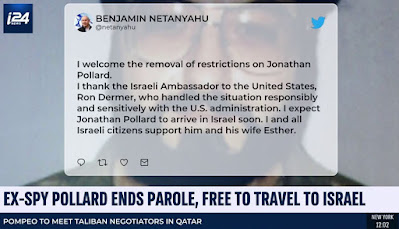On November 20, Jonathan Pollard, a former U.S. Navy
intelligence analyst convicted for betraying his country and selling national
defense information to Israel,
was freed from the terms of his post-confinement parole. That means he is now
free and will undoubtedly relocate to the country he spied for, Israel, where
he will be welcomed as a national hero.
Yes, that Israel,
one of America's
closest allies and a major benefactor of American aid, political support, intelligence
sharing, and other largesse. I have stated unequivocally in the past, and will
do so again - Pollard did irreparable harm to U.S. intelligence capabilities at
the behest of his Israeli masters, and got only partially what he deserved. If it
was up to me, he would still be in prison.
For those who may not be familiar with the treachery of
Jonathan Pollard, let’s recap.
Jonathan Pollard was employed as an analyst at the what is
now the U.S. Navy’s National Maritime
Intelligence Center
in Suitland, Maryland. He had been granted a Top Secret
clearance with access to Sensitive Compartmented Information (TS-SCI) and other
special access programs (SAP). Readers with experience in the military or
intelligence community will recognize those designations.
In 1984, Pollard volunteered his services to an Israeli Air
Force officer attending university in the United States. He continued to work
for the Israeli intelligence services until his arrest on November 21, 1985 as
he and his co-conspirator wife Anne attempted to enter the Israeli embassy in Washington, DC,
hoping to seek asylum.
Pollard made a plea deal with the U.S. government under which he
would plead guilty to one count of conspiracy to deliver national defense
information to a foreign government. Although that offense carries a maximum
sentence of life imprisonment, the prosecution agreed to recommend "only a
substantial number of years in prison."
However, citing Pollard’s repeated
violations of multiple terms of the agreement, on March 4, 1987, the judge
adjudicating the case imposed the maximum penalty, a life sentence. That
sentence was also greatly influenced by the classified damage-assessment
memorandum provided by Secretary of Defense Caspar Weinberger. I have seen the
damage assessment – it is truly devastating.
Apologists for Pollard claim that spying for Israel is "not really spying" since Israel is an ally of the United States. One
has to consider that blanket statement that Israel
is an ally of the United
States with some reticence. Israel used the information provided by Pollard
as "trade material" with the Russians - during the height of the Cold
War - in return for the release of Jews detained in Russia. That is hardly the action
of an ally of the United
States.
There is speculation that American agents, people the U.S. intelligence
agencies had recruited to collect information for us at great risk, were
uncovered and executed because of the information the Israelis provided to the
Russians. If that is the case, Pollard should have been executed instead of
being sentenced to life in prison.
There is a group of Pollard supporters who claim that Pollard
has been treated more harshly than others, but they fail to mention that others
in the same class as Pollard - CIA officer Aldrich Ames and FBI agent Robert
Hanssen - were also sentenced to life in prison. My response to the claim that other traitors have been given lesser sentences - the judges in those cases got it wrong; the
judge in the Pollard case (as well as with Ames and Hanssen) got it exactly right. Unfortunately,
prevailing laws at the time limits his “life” sentence to 30 years. That ended
on November 21, 2015. He has been on post-confinement parole since then. While
he could have been kept in that status for 15 years, he has been freed after
five.
Many Israeli leaders and media outlets are citing this as a
great day for Israel.
It is not at all – this merely reminds that 36 years ago, someone in the
Israeli intelligence services thought it would be a good idea to steal
intelligence information from their greatest ally and staunchest supporter, then
later reveal the sources and methods used to acquire that information to America’s
greatest foes. Hardly a great day for Israel.
So, the convicted felon/traitor Jonathan Pollard is now free
to go to Israel.
If he’s not in prison where he belongs, then I am glad he is not walking free
in my country. Good riddance. Israel,
you can have him – after all, you bought him.
To my Israeli and pro-Pollard Jewish friends (and I have
many): I know we disagree vehemently on this issue. I will not change my mind, nor
will I get involved in a drawn-out discussion where we are unlikely to resolve
our differences. This is my view - you are free to voice your own. I simply
will not respond to your misguided attempts to justify Pollard’s betrayal of my - and what was once his - country.
















